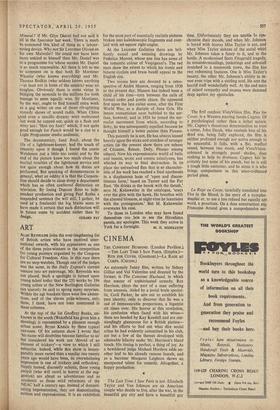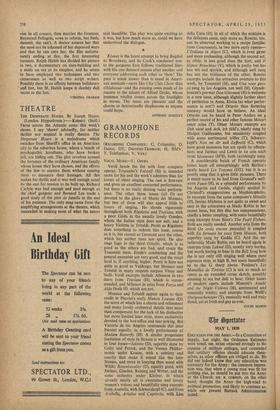CINEMA
THE CONSTANT HUSBAND. (London Pavilion.! —THE LAST TIME I SAW PARIS. (Empire.)— RUN FOR COVER. (GaUM0111.)—LA RAGE AU CORPS. (Curzon.) AN extremely funny film, written by Sidney Gilliat and Val Valentine and directed by the former, is The Constant Husband, in which that master of sophisticated comedy, Rcx Harrison, plays the part of a man suffering from amnesia. Aided by a jovial brain special- ist, Cecil Parker, he sets out to establish his past identity, only to discover that he was a cad of immeasurable proportions, a bigamist six times over. His horror at this revelation, his confusion when faced with his wives— these arc headed by Kay Kendall and are out- standingly glamorous for a British picture— and his efforts to find out what dire social crime he had evidently committed in his club, are but a few of the themes developed with admirable hilarity under Mr. Harrison's bland touch. His timing is perfect, a thing of joy. As a bewildered judge Michael Hordern adds an- other leaf to his already ramose laurels, and as a barrister Margaret Leighton shows an unexpected talent for comedy. Altogether, a happy production.
The Last Time I Saw Paris is not. Elizabeth Taylor and Van Johnson are an American couple who decide to live, after the war, in the beautiful gay city and have a beautiful gay time. Unfortunately they are unable to syn- chronise their moods, and when Mr. Johnson is bored with bistros Miss Taylor is not, and when Miss Taylor sickens of the social whirl Mr. Johnson takes a fancy to it, and to the bottle. A modernised Scott Fitzgerald tragedy, its misunderstandings, junkctings and sob-stuff stretched to a mammoth yawn, the film has two redeeming features. One is Miss Taylor's beauty, the other Mr. Johnson's ability to in- vest even tripe with a sterling soul. He acts the horrid stuff wonderfully well. At the end tears of mixed sympathy and nausea were dammed deep against my spectacles.
The first outdoor VistaVision film, Run for Cover, is a Western starring James Cagney. Of a psychological rather than a lethal nature, Mr. Cagney's disastrous determination to trust a rotter, John Derek, who reminds him of his dead son, being fully explored, the film is neither profound enough nor active enough to be successful. It falls, with a flat, muffled sound, between two stools, and VistaVision. coloured in strangely pastel shades, does nothing to help its drabness. Cagney has in- evitably lost some of his punch, but he is still a tough little customer, and he alone it is who brings compactness to this unco-ordinated period piece.
*
La Rage au Corps, tastefully translated into Fire in the Blood, is the story of a nympho- maniac or, to use a less refined but equally apt word, a prostitute. On a dam construction site Francoise Arnoul gives a comprehensive ser-
vice to all comers, then marries the foreman, Raymond Pcllegrin, vows to reform, but finds, dammit, she can't. A doctor assures her that she need not be ashamed of her depraved ways and that he can cure her, the film unfortu- nately ending at this, the first interesting moment. Ralph Habib has divided his picture in two, a documentary on dam-building and a study on sex at its simplest, and he seems to have employed two techniques and two cameramen as well as two script writers. Possibly there is an affinity between bulldozers and lust, but M. Habib keeps it deathly dull secret to the last.
VIRGINIA GRAHAM



















































 Previous page
Previous page